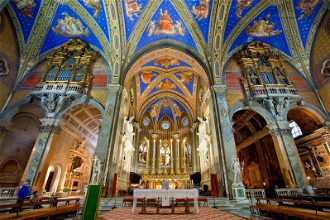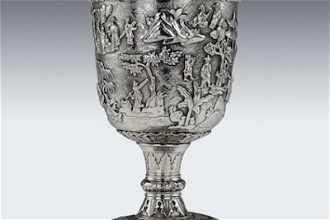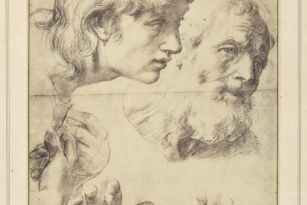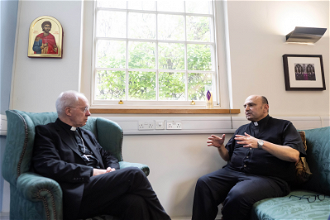Gospel in Art: If you believed Moses, you would believe me
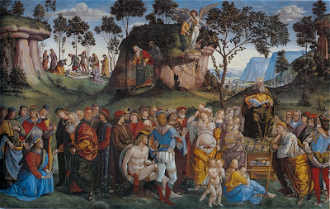
Testament and Death of Moses, by Luca Signorelli and Bartolomeo della Gatta, 1482, Fresco © Sistine Chapel, Vatican City / Wikimedia
Source: Christian Art
Gospel of 23 March 2023
John 5:31-47
Jesus said to the Jews: 'If I testify about myself, my testimony is not true. There is another who testifies on my behalf, and I know that his testimony to me is true.
You sent messengers to John, and he testified to the truth. Not that I accept such human testimony, but I say these things so that you may be saved. He was a burning and shining lamp, and you were willing to rejoice for a while in his light.
But I have a testimony greater than John's. The works that the Father has given me to complete, the very works that I am doing, testify on my behalf that the Father has sent me. And the Father who sent me has himself testified on my behalf. You have never heard his voice or seen his form, and you do not have his word abiding in you, because you do not believe him whom he has sent.
'You search the scriptures because you think that in them you have eternal life; and it is they that testify on my behalf. Yet you refuse to come to me to have life. I do not accept glory from human beings. But I know that you do not have the love of God in you. I have come in my Father's name, and you do not accept me; if another comes in his own name, you will accept him. How can you believe when you accept glory from one another and do not seek the glory that comes from the one who alone is God? Do not think that I will accuse you before the Father; your accuser is Moses, on whom you have set your hope. If you believed Moses, you would believe me, for he wrote about me. But if you do not believe what he wrote, how will you believe what I say?'
Reflection on the Fresco
On 27 October 1480 a group of Florentine painters left for Rome, where they had been called as part of the reconciliation project between Lorenzo de' Medici, the de facto ruler of Florence, and Pope Sixtus IV. The Florentines started to work in the Sistine Chapel as early as the Spring of 1481, along with Pietro Perugino, who was already there. Neither Bartolomeo della Gatta nor Luca Signorelli (who was thirty at the time) appear in the official contracts signed between the Papal court and the painters, but they were most likely among the assistants of Perugino, who was the general superintendent of the works. Signorelli is mentioned in the Sistine Chapel after his master left in 1482, as the author of the fresco we are looking at today: the Testament and Death of Moses.
The fresco portrays various episodes in Moses' life. Moses is always recognisable by his yellow garments and the green cloak. We see in the background Moses on a mount receiving the command baton by an angel, which gives him the authority to lead the Israelites towards the Promised land. In the foreground, on the right, is a 120-year-old Moses speaking at the crowd while holding the baton and a Holy Book: rays of light stem from his head. At his feet is the Ark of the Covenant, the stone tablets and the vase holding the manna. The scene on the left shows the appointment of Joshua as Moses' successor. Finally, on the left background, is the corpse of Moses on a shroud, surrounded by the dismayed Israelites.
We mostly think of Jesus as being a quiet, softly spoken, gentle, friendly, peaceful man, which of course he was. However, whenever necessary, he was confrontational and didn't shy away from speaking his mind, as is on full display in today's reading. Talking to the Pharisees, he tells them that whilst they are great experts in the Law of Moses and pretend to fulfil every letter of that law, they are deceiving themselves. He even goes as far as saying that their actions are condemned by that same Law on which they claim to be experts: 'You place your hopes on Moses, but Moses will be your accuser'. The Pharisees thought that strict obedience to rules would earn the approval of God.
LINKS
Gospel in Art: https://christian.art/
Today's reflection: https://christian.art/daily-gospel-reading/john-5-31-47-2023/



